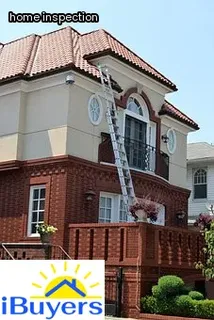When it comes to home inspection defects, it is important to understand who is responsible for them. Generally, a home inspector is not liable for any undisclosed issues that may arise after the inspection has been completed; however, depending on the situation, there are certain cases in which you may be able to sue a home inspector for failure to disclose existing defects.
When considering whether or not you have grounds to take legal action against a home inspector, the key factors include the type of defect involved, whether or not the issue was listed in the contract agreement and if negligence on behalf of the inspector was present. Additionally, even if an inspector missed something during their initial assessment of your property, they may still not be held legally accountable.
Ultimately, when dealing with potential home inspection defects and possible legal repercussions it is always best to consult a lawyer and go over your individual circumstances.

When hiring a home inspector, it is important for the buyer to understand the obligations of the inspector. Home inspectors are tasked with evaluating a property prior to purchase in order to identify any defects or issues that may be present.
They also have an obligation to disclose any major issues that were discovered during the inspection. If a major issue is not disclosed, then it could be grounds for a lawsuit if the buyer experiences damages due to this undisclosed defect.
This could include anything from serious structural damage to faulty plumbing, wiring, or HVAC systems. It is therefore important for buyers to thoroughly review the inspection report and ask questions about anything they do not understand before agreeing to purchase the property.
If legal action against a home inspector seems like an extreme response to issues with undisclosed defects, there are alternatives. The first step is to document the defects and contact the home inspector to discuss the situation.
If you remain unsatisfied with their response, consider taking your complaint to a professional organization for resolution. Many states have organizations that specialize in filing complaints against home inspectors and investigating them on behalf of consumers.
They may be able to help resolve your issue without involving the court system. Additionally, it may be beneficial to reach out to local consumer protection agencies or real estate boards for advice and assistance.
Ultimately, if you feel that legal action is necessary against your home inspector, consult an experienced attorney who can advise you on your best options moving forward.

Negligence is a legal term used to describe an action or inaction that does not meet the legal standard of care that would be expected from a reasonably prudent person. When it comes to home inspections, negligence is a major factor when it comes to determining whether or not a home inspector can be successfully sued for undisclosed defects.
If the home inspector fails to identify and disclose any material defects in the property, then they may be considered negligent in their duty as an inspector. It's important for homeowners to understand that negligence on the part of a home inspector can lead to costly repairs and litigation expenses if the damages are extensive enough.
Additionally, negligence on the part of a home inspector could result in decreased property values and even safety hazards if certain issues are not identified in time. Understanding how negligence applies in this context can help homeowners make informed decisions about whether or not they should pursue legal action against an inspector who fails to properly inspect their property.
Home inspections are an important part of the home-buying process and both buyers and sellers should be aware of their rights and responsibilities. As a buyer, you have the right to know potential issues with the home prior to purchase, so thorough inspections should always be done.
The seller is also responsible for disclosing any known defects before the inspection takes place. Inspectors themselves are not liable for undisclosed issues, as they are only required to use standard practices during their examinations.
Generally, if an inspector fails to report on a defect that is visible or easily detectable, then you may have legal recourse against them. However, if it's something that would require specialized knowledge or equipment to uncover, then it may not be possible to sue the inspector for not detecting it.
Ultimately, buyers should take extra caution when buying a home and exercise their due diligence to ensure they are making a sound investment decision.

When it comes to suing a home inspector for undisclosed defects, it's important to understand the difference between civil and criminal law. Civil law governs disputes between two or more parties which typically involves monetary compensation.
Criminal law is concerned with punishing punishable offenses such as fraud or negligence. When it comes to home inspectors, they can be held liable under both civil and criminal law.
Civil liability could include breach of contract, professional negligence, or misrepresentation of facts while criminal liability could include fraud or providing false information. Home inspectors must adhere to certain guidelines when conducting inspections and any violations may result in both civil and criminal penalties.
It is important for home buyers to be aware of their rights and ensure that any inspection report provided is accurate and complete in order to protect themselves from potential legal action.
When it comes to filing a lawsuit against a home inspector for undisclosed defects, there are important statutes of limitations that come into play. Different states have different time frames for when one is allowed to sue and many require that the suit is filed within two years of the inspection date.
Additionally, some states may have shorter or longer periods for certain types of property damage claims. It's important to know the specific laws in your state before pursuing legal action.
Court decisions can be based on whether or not it was reasonable to file suit within the allotted time frame given all relevant circumstances. Failing to file a lawsuit within the statute of limitations can mean potentially losing out on compensation due to defects in a home inspection report.
Therefore, any potential claimants should make sure they are familiar with their state's statutes of limitations when considering suing a home inspector for failure to disclose any defects uncovered during an inspection.

When it comes to home inspections, professional negligence by the inspector can become an issue for both buyers and sellers. Professional negligence is defined as a failure to exercise due care or reasonable skill in making sure that any defects in the home are identified.
Home inspectors need to be thorough and accurate when conducting their inspections, looking for any issues that could affect the safety of the residence. If a home inspector fails to identify a defect that they should have found, they may be liable for damages resulting from their omission.
This includes undisclosed problems with wiring, plumbing, stuctural integrity, and other important elements of the home. In some cases, buyers or sellers may decide to take legal action against an inspector if their negligence has caused them financial harm or other losses.
It is important for those who are considering legal action against a home inspector to understand their rights and obligations under applicable laws.
If you believe a home inspector has not disclosed defects in the property they have inspected, it is important to understand your rights and how to go about preparing your case for potential litigation. Gathering evidence should be a priority - this may include collecting photographs and videos of the property, along with written contracts and any other paperwork that could support your claim.
You should also speak with witnesses who were present during the inspection as their testimony could prove invaluable in court. It is also important to understand what you can sue for, including any financial losses or emotional distress caused by the home inspector’s negligence.
You should consult an attorney to help build a strong case against the home inspector and ensure that all documents are filed correctly with the court system. It is wise to research different attorneys before making a decision on who will represent you in court.
Finally, if you plan on suing the home inspector, make sure you are aware of applicable deadlines and statutes of limitations as these could prevent you from filing suit down the line if not kept in mind.

When selecting an attorney to represent you in a dispute with a home inspector, it is important to consider the attorney’s qualifications and experience. Look for an attorney who specializes in cases involving real estate and construction law, as they will have the best understanding of your case.
Ask the attorney questions about their background, such as how long they’ve been practicing and how many cases like yours they’ve handled. You should also research any disciplinary actions taken against them by their state bar association and if any complaints have been filed against them.
Additionally, be sure to ask what type of fees and payment arrangements are available for their services, so you can make an informed decision about legal representation. Finally, find out what methods of communication the attorney uses (e.
email, phone calls) so that you can stay up-to-date on your case and share information or documents quickly when needed. Choosing the right attorney is key to pursuing legal action against a home inspector for undisclosed defects or other issues associated with your property inspection.
If you are considering filing a lawsuit against a home inspector for undisclosed defects, it is important to know that the process of negotiation with your inspector can be lengthy. To successfully negotiate with a home inspector after filing suit, it is essential to prepare in advance and be mindful of certain strategies.
First, you should research and understand the law related to home inspections in your state. Additionally, you should document all evidence such as photography or video recordings that show the defect in your home before and after the inspection.
This will help prove negligence on the part of the inspector. Furthermore, it is wise to have an experienced attorney who understands real estate law represent you during negotiations.
Lastly, when negotiating with your home inspector, ensure that any final agreement includes language that requires them to pay for repairs and other related costs associated with the defect. When done properly, these strategies can help ensure that you receive fair compensation for any damages caused by an inspection gone wrong.

When considering filing a complaint against your home inspector for undisclosed defects, there are several factors that must be taken into account. First of all, it is important to understand the laws in your state or province regarding home inspection.
It is also necessary to determine if the defect was something that your inspector should have been able to identify and disclose during the inspection process. Additionally, you will need to assess if any potential damage or loss was caused as a result of your home inspector's failure to detect and report on the defect.
Furthermore, it is important to review any contracts or agreements between you and your home inspector, as this could affect what type of legal action may be taken in the case of a dispute. Lastly, consulting with an attorney who specializes in real estate and construction law can provide invaluable guidance when determining whether suing a home inspector for undisclosed defects is the best course of action.
When suing a home inspector for undisclosed defects, it is important to be aware of common mistakes that could jeopardize your case. First, make sure you are pursuing the right legal action.
In some cases, the defect may actually be due to negligence on the part of the homeowner or contractor, and not the inspector. Secondly, be familiar with all relevant state laws governing home inspections and lawsuits.
Thirdly, be sure to have a clear understanding of the scope of work performed by the inspector, as well as any disclaimers that may have been included in his or her report. Fourth, ensure that you have all necessary evidence to prove your case such as photos and videos of any damage caused by an undisclosed defect.
Fifth, if possible, hire an attorney who specializes in this type of litigation in order to provide you with appropriate legal advice throughout the process. Lastly, always remember that suing a home inspector for undisclosed defects can be an expensive and time-consuming endeavor so make sure you are prepared before making any decisions.

It can be difficult to prove negligence on the part of a property inspector when it comes to undisclosed defects. In many cases, the burden of proof falls on the homeowner or buyer who needs to demonstrate that the inspector had a duty of care, that they breached this duty by failing to identify or disclose certain defects, and that these undisclosed defects resulted in damages.
It is also important to consider any disclaimers mentioned in the home inspection report, as these can limit an inspector’s liability for missed issues. The homeowner may also need to prove that the inspector was negligent in their duties by providing evidence such as photos, expert testimony from contractors or other professionals, and records of repair costs.
In some cases, legal action may be necessary in order to obtain compensation for damages incurred due to undisclosed defects. Ultimately, anyone considering suing a property inspector should seek legal advice before taking any further steps.
When faced with an unresolved dispute with your home inspector, it is important to understand the legal implications of filing a lawsuit and the potential costs associated with litigation. Generally speaking, suing a home inspector for undisclosed defects can be difficult and costly as they are typically protected by professional liability insurance policies.
To avoid lengthy and costly legal proceedings, there are cost-effective solutions that can help resolve conflicts in a timely manner. For example, seeking arbitration or mediation can provide an unbiased third party to assess the situation and ensure that both parties’ interests are represented fairly.
Additionally, joining a local or state home inspector organization may provide access to grievance services or other dispute resolution resources. Finally, hiring another home inspector for an objective opinion can also help settle disagreements without going through the court system.

Navigating contractual obligations and insurance coverage in suing a property inspector can be a complex process. A home inspection is a vital part of any real estate transaction, as it helps make sure that the home is safe and free from major defects.
Unfortunately, sometimes inspectors miss or fail to disclose certain issues with the home, leading to costly repairs for the homeowner down the line. This raises the question of whether homeowners can sue their property inspector for undisclosed defects.
Generally speaking, homeowners do have legal recourse against their inspector if they can prove that the inspector was negligent in their duties. However, this does depend on what is included in the contract between the homeowner and inspector, as well as whether or not the inspector has proper insurance coverage for such claims.
Homeowners should consult an experienced attorney before filing suit against their home inspector to ensure that they are able to successfully navigate any contractual obligations and insurance coverage issues that may arise during such a case.
When you decide to sue a property inspector for undisclosed defects, it is important to understand the type of damages that can be recovered and what pre-trial resolution options are available. In some cases, going to court may be necessary but there can also be resolutions found through mediation or other alternative dispute resolution methods.
Depending on the facts of the case, you may be able to recover monetary damages as compensation for repairs or remuneration for emotional distress caused by the inspection. Although a lawsuit can take time and money, it may be worth it if you have been wronged due to an inadequate inspection.
On the other hand, pursuing an out of court settlement can provide a more timely resolution and help avoid legal fees. Ultimately, having a proper understanding of all your options will help ensure that you make an informed decision about how best to proceed with your dispute over a property inspection.
A: While it is possible to sue a home inspector, it is important to speak with counsel first. Lawyers can provide legal advice and help determine if there is any legally binding legal liability on behalf of the home inspector.
A: Yes, it is possible to sue a home inspector for fraudulent behavior. However, you will need to demonstrate that the inspector engaged in willful and intentional deceit or misrepresentation in order to make a successful claim.

A: Generally no, as the independent home inspector is not under the control of the Real Estate Agency, Agent, Broker, or REALTOR. However, if there were any misrepresentations made by them regarding the qualifications and expertise of the inspector you could potentially pursue legal action.
A: Yes, you may be able to take legal action against the estate agent/agency if they have provided a negligent recommendation. You should contact them directly via email or phone using the address/number given by the company to discuss your options further.
A: Yes, if you believe your home inspector failed to exercise reasonable care and did not provide a reasonable standard of inspection services, you may be able to pursue legal action.

A: Yes, if you believe the home inspector has breached their warranty obligations related to the ceiling, sink, or other components you can sue them for any damages that may have occurred as a result.
A: Generally, no. Waiving the ZIP code requirement typically means that you have accepted whatever service and expertise the home inspector provides.
A: Yes, you may be able to sue a home inspector if they fail to identify mold or moisture issues and do not provide an appropriate level of indemnity or indemnity insurance.

A: Yes, you can sue a home inspector for negligence if they fail to identify or report on an issue with the property that leads to additional costs or damages.
A: Yes, you may be able to sue your home inspector for negligence if they failed to detect a faulty heater or furniture that was covered by a home warranty. You should consult with an attorney to discuss the specifics of your case.